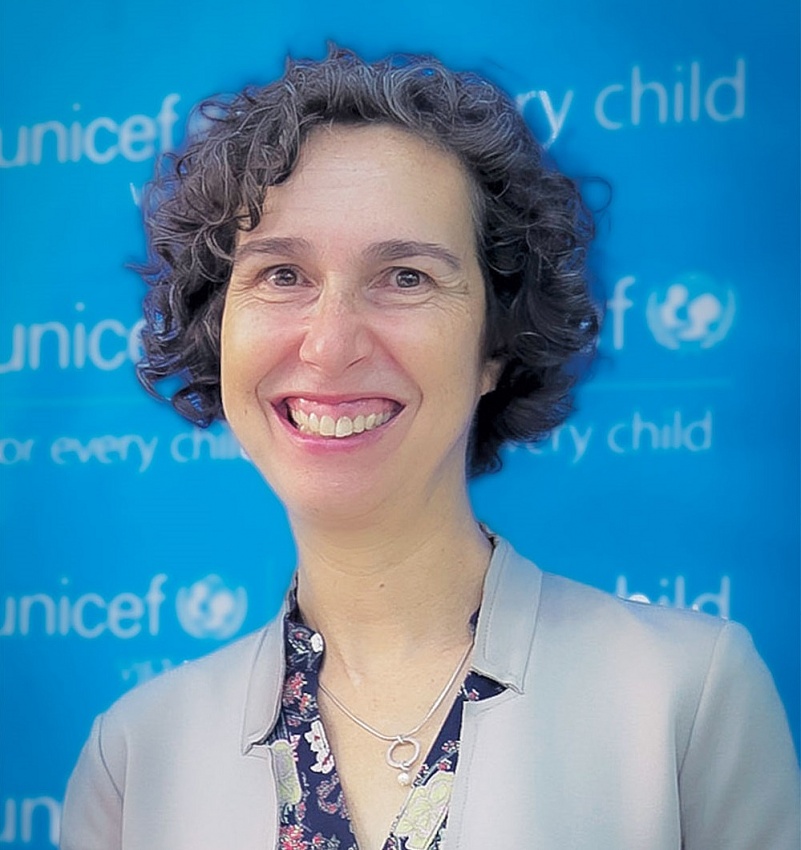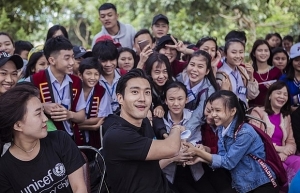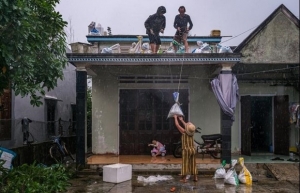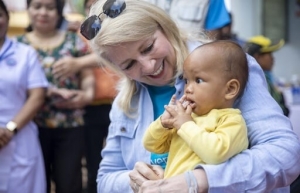The private sector role in child health
How has progress been in Vietnam in terms of child protection and healthcare activities in the past year or so?
 |
| Lesley Miller, deputy representative of UNICEF Vietnam |
The past year brought key progress in this area. The child protection regulatory framework was strengthened, and social work development, inter-agency cooperation on violence against children and child justice are now further supported with the development of various legal documents.
An inter-sectoral protocol has also been created to provide the framework for provision of integrated care and support to victims of violence. These are relevant steps that UNICEF supported and will continue to do so.
In addition, as mental health has become a growing and evolving area of priority, we worked with partners to enhance UNICEF’s support to protect children and adolescents from mental health issues. Promotion of mental wellbeing, prevention and programming in schools was improved last year through trainings; a ground-breaking study undertaken by UNICEF and the Ministry of Education and Training focusing on school-related mental health risk factors; and consultations, workshops, and conferences with adolescents and young people were conducted to increase their participation in promoting good mental health.
There are key challenges that need coordinated and consistent efforts by all stakeholders – the government, communities, families, the international community, just everybody. Like all countries, Vietnam is still grappling with the far-reaching socioeconomic impacts of the pandemic, which are particularly devastating for the most vulnerable – children with disabilities, ethnic minorities, and those affected by migration, climate change, and a deteriorating environment.
The pandemic also aggravated the need for social assistance to support children and families living in poverty, with an estimated 19.5 per cent of them in Vietnam at risk of multidimensional poverty. Increased and improved investment in social assistance is needed, especially for families.
Progress towards achieving the UN’s Sustainable Development Goals has slowed down on many fronts, notably routine immunisation coverage for children under one year of age, which has dropped from over 80 to 67 per cent as of November 2022. Likewise, progress in reducing violence against children has stalled, with over 72 per cent aged under 14 experiencing violent discipline at home.
Vietnam is not alone in struggling with these issues, but what sets Vietnam apart is its impressive commitment, capacity, and resources to tackle these challenges as a matter of urgent priority.
How have businesses in Vietnam made contributions to this effort?
Vietnam has a vibrant private sector which has full potential to contribute to the realisation of children’s rights. UNICEF has been a key partner with businesses working to raise awareness about these rights and business principles, and to build their capacity to develop and implement family-friendly policies and improve the work environment for working parents.
Children have a stake in business as consumers, dependents of employees, young workers, future employees, business leaders, and as citizens in the communities and environments in which business operates. Businesses large and small inevitably interact with and affect the lives of children. Whether by sponsoring scholarships to promote girls’ education or financing a support grant for young people living in poverty, or implementing codes of conduct that ban child labour in the supply chain, business plays a key role in advancing such rights.
Businesses can improve the rights of children and protect them from harm through the way in which they treat employees, operate their facilities, develop and market their products, provide their services, and exert their influence on economic and social development.
UNICEF is working with businesses in Vietnam which are promoting positive parenting practices among their employees and supporting our education initiative. Companies can drive significant change for children. They play a role in the elimination of child labour, in providing decent work for young workers, parents and caregivers or ensuring that their products and services are safe and respectful.
What is the status of the quality of healthcare and education for children in Vietnam, and what should the government focus on to increase accessibility to all?
While healthcare for women and children has improved in Vietnam over the past few decades, progress has been slower for some vulnerable groups like certain ethnic minorities. For example, the under-5 mortality rate for some populations is still 3.5 times higher than others. Similarly, it is estimated that over 90 per cent of 200,000 children who annually suffer from severe acute malnutrition (SAM) do not have access to treatment.
Unfortunately, SAM puts lives at risk, and a substantial proportion of affected children are from poor families and from ethnic minority background. The most efficient and effective path to increase access to SAM treatment is by ensuring it is covered through health insurance. Although this may take time, interim solutions can be introduced, including the allocation of resources for procurement of therapeutic products to provide life-saving treatment to children across the country.
Routine immunisation is another matter of concern, with around 245,000 children below one year of age who missed one or more doses of critical DPT vaccinations in 2021. Addressing these issues should be a priority for 2023.
Data shows that children in Vietnam learn more the longer they stay in school, which speaks to the quality of education service delivery. As teachers are the cornerstone of the learning process and are a strong determinant of quality, UNICEF promotes increased investment in building teacher capacity across multiple domains, but particularly in the areas of social-emotional learning and mental health awareness.
The area of skills-based learning including digital and technology-based learning is also a priority, which emerged as a key national strategy to bridging the learning loss from the pandemic.
The most effective use of technology in education is still being explored, and so UNICEF is working with our partners to test and institutionalise technology-based innovation at all school levels.
 | Korean artists to join UNICEF’s anti-bullying campaign in Vietnam Choi Si-won, a member of the boy’s group Super Junior of the Republic of Korea, will join UNICEF’s #StopBullying campaign in Vietnam, which looks to raise awareness of young people on bullying and to engage them on how to develop solutions to end this problem. |
 | UNICEF vows to support Vietnam in response to Typhoon Noru UNICEF Vietnam expressed its concern over children and families in the country vulnerable to Typhoon Noru, saying it stands ready to support the Government of Vietnam in responding to the most powerful storm to hit Vietnam in 20 years, according to a recent statement. |
 | UNICEF leader values Vietnam’s achievements in child protection, care The Executive Director of the United Nations Children’s Fund (UNICEF), Catherine Russell, highly valued Vietnam’s achievements in child protection and care during a three-day visit to Vietnam that concluded on November 13. |
What the stars mean:
★ Poor ★ ★ Promising ★★★ Good ★★★★ Very good ★★★★★ Exceptional
Related Contents
Latest News
More News
- State corporations poised to drive 2026 growth (February 03, 2026 | 13:58)
- Why high-tech talent will define Vietnam’s growth (February 02, 2026 | 10:47)
- FMCG resilience amid varying storms (February 02, 2026 | 10:00)
- Customs reforms strengthen business confidence, support trade growth (February 01, 2026 | 08:20)
- Vietnam and US to launch sixth trade negotiation round (January 30, 2026 | 15:19)
- Digital publishing emerges as key growth driver in Vietnam (January 30, 2026 | 10:59)
- EVN signs key contract for Tri An hydropower expansion (January 30, 2026 | 10:57)
- Vietnam to lead trade growth in ASEAN (January 29, 2026 | 15:08)
- Carlsberg Vietnam delivers Lunar New Year support in central region (January 28, 2026 | 17:19)
- TikTok penalised $35,000 in Vietnam for consumer protection violations (January 28, 2026 | 17:15)

 Tag:
Tag:



















 Mobile Version
Mobile Version